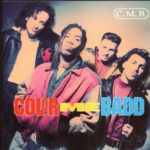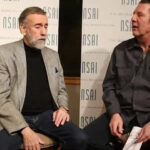My Darling Clementine has carved a unique niche in the contemporary music scene, reviving the classic country duet with a distinctly British sensibility. This interview delves into the heart of the project, exploring the motivations, musical inspirations, and creative processes behind this critically acclaimed band, ensuring fans and new listeners alike gain a deeper appreciation for their artistry.
The Genesis of My Darling Clementine: A Musical Partnership
The inception of My Darling Clementine wasn’t merely about two talented musicians joining forces; it was a strategic and deeply personal decision. For Lou Dalgleish, it marked a return to the forefront of the music scene after a period focused on family. While she had remained active with projects like a UK tour with The Brodsky Quarter and the stage show They Call Her Natasha, album creation had taken a backseat. The collaboration with Michael Weston King presented an ideal opportunity to reignite her recording career.
King, on the other hand, was seeking a fresh direction after a successful solo career and his time with The Good Sons. He candidly admits to wanting to “get back into show business,” missing the dynamism of a full band and the collaborative energy of performing with others. The somewhat solitary nature of his troubadour years had run its course. The concept of a duets album had been brewing, but the realization that he was married to “one of the best female singers in the country” made the choice of partner exceptionally clear and profoundly personal. This organic partnership became the bedrock of My Darling Clementine’s distinctive sound and appeal.
Embracing the Country Duet Tradition
My Darling Clementine consciously taps into the rich vein of traditional country music, specifically the duet format popularized by legends like George Jones and Tammy Wynette. King explains that writing songs in this vein came surprisingly naturally. He had accumulated songs over time that were perhaps “too country” for his previous projects, songs that now found their perfect home within the My Darling Clementine framework.
To fully immerse themselves in the genre, they revisited the classic country music of the 1980s and beyond, drawing inspiration from icons like Hank Williams, George Jones, Willie Nelson, Merle Haggard, Loretta Lynn, Porter Wagoner, and Dolly Parton. This deep dive into the masters of country music solidified their commitment to authenticity and informed their songwriting and sonic approach.
The Craft of Country Songwriting: Conciseness and Emotion
While the classic country sound might appear simple, crafting compelling songs within the genre’s conventions is a demanding art. King emphasizes the discipline required to write for two voices and adhere to the traditional three-minute song length. The challenge lies in telling a complete and poignant story succinctly, often within just a few lines. He expresses immense admiration for songwriters like Hank Williams, Harlan Howard, and Merle Haggard, recognizing them as masters of this concise and impactful storytelling. In contrast to rambling narratives, the strength of classic country lies in its directness and emotional punch.
Recreating the Nashville Sound: Authenticity in the Studio
For their debut album, How Do You Plead?, My Darling Clementine aimed for sonic authenticity, setting out to create a record that sounded as if it were recorded in 1969 Nashville. They chose Gold Top studio in Chalk Farm, known for Nick Lowe’s “quiet” albums, and assembled a band of musicians who deeply understood and appreciated the classic country genre. These were players who, in their estimation, surpassed even many contemporary Nashville session musicians in their grasp of traditional country music.
This dedication to recreating the classic Nashville sound was not just about nostalgia; it was about capturing the raw emotion and timeless quality inherent in those recordings. They focused on capturing a genuine feeling, prioritizing musical integrity over chasing current trends.
Timeless Themes and Contemporary Resonance
My Darling Clementine’s music resonates with a contemporary audience precisely because the themes they explore are timeless. While inspired by classic country, their songs grapple with relationship dynamics, personal struggles, and universal emotions that remain relevant across generations. King points out that the challenges faced by couples in their 40s today are often the same as those faced by previous generations.
The “bickering couple” persona they sometimes adopt on stage, often played for comedic effect, draws from relatable experiences and observations. While humor is a component, their songs also delve into deeper emotions, ensuring a balanced and emotionally resonant listening experience. This blend of lightheartedness and raw emotion makes their music both entertaining and profoundly moving.
Balancing Humor and Heartbreak: The Emotional Spectrum
The duo acknowledges the importance of balancing the lighter, more humorous aspects of their music with moments of raw emotional depth. While songs like I Bought Some Roses and No Heart In This Heartache embrace a wry, tongue-in-cheek approach reminiscent of classic country songs like Jackson or We Ought To Be Ashamed, they also tackle heavier subjects.
Songs like Ashes, Flowers and Dust, written after the loss of both their parents, showcase a profound emotional vulnerability. Similarly, No Matter What Tammy Said addresses the serious issue of domestic violence. This juxtaposition of humor and heartbreak provides emotional variety and keeps listeners engaged, reflecting the complexities of real-life relationships. The band emphasizes that these thematic choices are organic, arising from their experiences and observations rather than calculated decisions to create specific emotional contrasts.
Critical Acclaim and Audience Connection
My Darling Clementine’s albums have garnered significant critical acclaim and resonated deeply with audiences, even making inroads into the mainstream. This success surprised them to some extent, but King attributes it to the accessibility and immediacy of their songs. The strong melodies and relatable themes allow audiences to connect with their music instantly, even when hearing it for the first time. This melodic focus, a passion for King, ensures that their songs linger in the listener’s mind, fostering a lasting connection.
Nashville Reception: “Coals to Newcastle” Triumphs
Playing at the Americana Music Association festival in Nashville presented a unique “coals to Newcastle” scenario. However, My Darling Clementine’s authentic approach and musical skill won over the Nashville audience. At the legendary Station Inn, they concluded their set with a rendition of She Thinks I Still Care, a potentially risky move in such a traditional country venue. Instead of being “bottled off,” they received a standing ovation, a testament to their ability to honor the tradition while bringing their own unique voice to the genre.
Evolving Sound: Looking to the Future
Looking ahead, My Darling Clementine is planning a third album, envisioning a slight sonic evolution. While committed to “great players playing real instruments” and classic country instrumentation, they are considering expanding their sonic palette. King expresses a desire to move beyond the steel guitar/fiddle/acoustic guitar setup, hinting at incorporating more horns, inspired by the “deep south Muscle Shoals sound” they experimented with on their third album.
They also express interest in collaborating with producer Joe Henry and even bringing Elvis Costello out of “production retirement.” These potential collaborations suggest a desire to push their creative boundaries while remaining true to the core essence of My Darling Clementine’s musical identity.
Balancing Solo and Collaborative Paths
While My Darling Clementine is currently their primary focus, both Dalgleish and King retain their individual musical identities. Dalgleish, after her hiatus, is fully committed to the band but leaves open the possibility of future solo work. King has been quietly developing material for a new solo album, envisioning a “simple, spare route” inspired by albums like Robbie Fulks’ Gone Away Backward and Guy Clark’s My Favourite Picture Of You. This balance between their collaborative project and individual artistic pursuits enriches their musical landscape and ensures continued creative vitality.
The Thriving UK Country Scene: Emulation, Not Imitation
My Darling Clementine is part of a healthy and growing UK country music scene, characterized by original songwriting and performance. King attributes this growth to the increasing acceptance of country music, particularly in its Americana guise, among younger audiences. This acceptance has inspired UK artists to emulate rather than simply copy American country music, fostering a unique and authentic UK country sound. The shift in venues, with folk clubs embracing Americana and roots music, has further supported this burgeoning scene.
Enduring Passion: The Vocation of Music
Despite the challenges and frustrations inherent in a musical career, King’s passion for music remains undiminished. He describes it as a “vocation,” not just a job, a sentiment echoed by Dalgleish. The joy of performing live, connecting with audiences, and experiencing new places on tour fuels their enduring commitment. For both of them, music is more than just a career; it’s a fundamental part of their lives, “for better or worse, for richer or poorer.”
Future Aspirations: Continued Growth and New Ventures
My Darling Clementine’s hopes for the future are grounded in continued artistic growth and reaching wider audiences. Securing funding for their next album and further developing their songwriting and musicianship are key priorities. They aim to surpass their previous work, expand their fanbase, and maintain a trajectory of upward momentum.
Beyond album creation, they are also excited about their collaboration with crime writer Mark Billingham on The Other Half, a “music and spoken word” project. This innovative project, featuring a short story by Billingham interwoven with their songs, has expanded their creative horizons and opened up new avenues for artistic expression, demonstrating their willingness to experiment and push boundaries while staying true to their musical core.


